
In a highly regulated environment, lawyers must engage as trusted business partners to assess and articulate risk for their clients. Shaping commercial strategy to drive growth will require the provision of practical and lucid legal advice aimed at fostering new, compliant, endeavours. Clear-cut objective data and intuitive tools remain vital for avoiding existing dangers and staying within tested limits.
The unprecedented power and crisp insight delivered by ACCC Analyser helps in understanding past courses of action, the outcomes and overall risk. These insights will play an important role in the advice legal practitioners provide to clients.
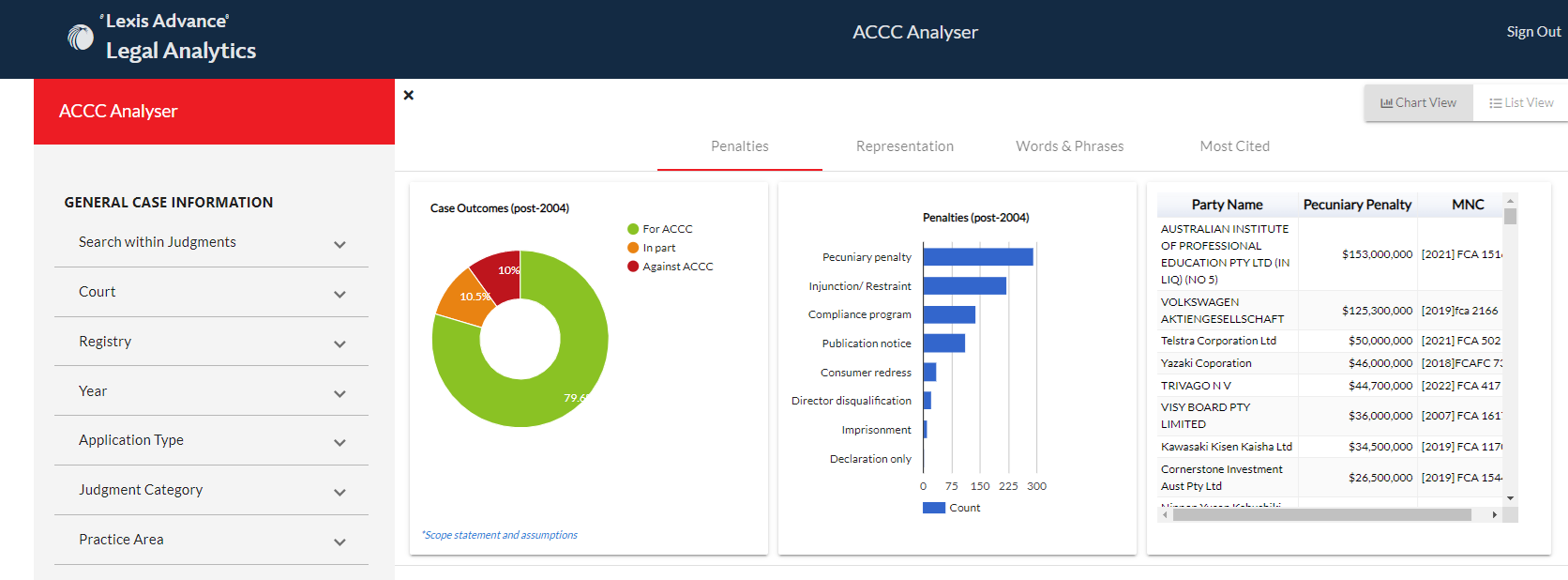
View outcomes as you adjust context specific filters to include top pecuniary penalties and detailed penalty breakdown.
ACCC Analyser mines litigation data to provide meaningful and actionable insights into litigation trends and the range of penalties that actually materialise in ACCC cases. Using Analyser, practitioners can:
- [Better advise on] likely penalties for a matter on foot, based on the historical range of outcomes for similar conduct, parties and sections contravened.
- Gain insights on Judges, Parties and Opposing Counsel; monitor the players and delve into the relationships between specific entities.
- Gain competitive intelligence to find out who has the most experience in a specific practice area and
- Extract key summaries to support litigation planning, thought leadership, media release creation and business development.
For more information or to request a trial, please contact your Relationship Manager contact us here.

Update
The second quarter of 2022 sees a number of titles being released. These include Covell & Lupton Principles of Remedies 8th edition by Covell, Lupton & Parsons. This eighth edition has been extensively revised and updated, including coverage of the evolution of online remedies and search, orders as well as intriguing High Court judgments on remedies law, jurisprudence and the Constitutional injunction.
Other titles anticipated to publish in the second quarter of 2022 are:
- Australian Uniform Evidence Law: Principles and Context 2nd ed by Bellew et al
- Consumer Protection Law in Australia 4th ed by Bruce
- Practising Family Law 5th ed, by Serisier
- Australian Migration Legislation Collection June 2022 edition by Fernandez et al
Recently released

DISCRETION IN CRIMINAL JUSTICE
By Nicholas Cowdery
What inspired you to write a book on Discretion in Criminal Justice
As Director of Public Prosecutions for NSW I was constantly required to exercise discretion in high-level decision-making in our cases, but there was little guidance available apart from the Prosecution Guidelines – I learned by doing. After retirement I designed and came to teach “Discretion in Criminal Justice” as a postgraduate elective subject at the University of Sydney, but there was no textbook and materials were sparse and scattered. So I thought that the book could assist in both practical and academic areas and also provide useful information.
What role does discretion play in the criminal justice system?
It is a central feature of all stages of the criminal justice process. Discretion applies to the process of decision-making where there is no single, unarguable or predominant outcome indicated and a choice must be made from available options within permissible limits – by the exercise of judgment. Such decision-making is essential to enable justice to be done, taking into account the law, the facts, such standards as exist and the objective and subjective factors that are operating. The cover of the book shows justice being reached by a course that requires twists and turns to be taken in a discretionary way.
Can you give some examples of discretion for us to understand the concept with context?
A police officer may see a criminal infringement being committed but will need to exercise discretion in deciding whether or not to warn or charge the person involved or to ignore the event and move on. A prosecutor may have available a number of different charges of differing severity that could be prosecuted but will need to decide how to proceed in court. A magistrate or judge may need to decide the penalty to be imposed and will have to exercise discretion (or judgment) in weighing competing objective and subjective circumstances to arrive at an appropriate penalty that is legally available. These and other decisions are not black and white or prescribed somewhere and discretion has to be exercised. The decisions made also should be reviewable in case of error.
What advice would you give to practitioners who come across cases involving discretion?
All criminal cases involve discretion at some point(s). Practitioners needing to make decisions or monitor the decisions of others in the process need to be aware of the applicable law, the evidence available and the facts to be drawn from it, applicable guidelines and procedures, objective and subjective considerations and the need to seek to achieve justice overall.
For more information about Discretion in Criminal Justice, or any of our recent or upcoming releases, please contact your Relationship Manager or contact us here .

The estimates guide to parliamentary process
Federal and State Government budgets typically dominate the calendars of parliamentarians, lobbyists, corporate decision makers and the non-for-profit sector in the first half of the year. This is also when the Additional Budget Estimates are held, before the Budget is handed down, and Budget Estimates (proper) proceed, after the Budget is handed down.
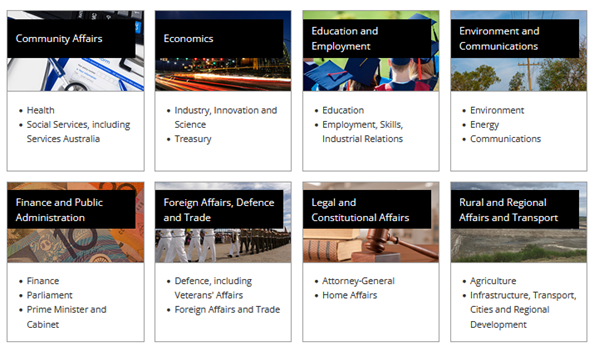
After the Budget is presented in the House of Reps via the Treasurer’s speech at 7.30pm on Budget Night the Appropriation Bills would be debated, typically for several weeks and before they can move to the Senate for consideration. Instead of waiting for the process to run its course in the Reps before those Bills can go to the Senate, the Bills are instead immediately referred to the Committees listed above as documents entitled Particulars of Certain Proposed Expenditure. These documents replicate the specifics of proposed expenditure contained in the Bills for the Committees to scrutinise before the Bills arrive in the Senate after passage at the Reps. This process is repeated when the Additional Estimates are held each year also.
In an election year such as 2022 this process was sped up even more as the Committees had to complete a round of scrutiny before the Prime Minister visited the Governor General to officially call the election less than two weeks after the Budget was handed down. Australia's 46th Parliament formally rose for the final time on Thursday 31 March 2022, despite legislation committees continuing to operate until the end of the week after. The 46th Parliament was prorogued at 9.29am on Monday 11 April, dissolving the House of Representatives at 9.30am, see here and paving the way for the 2022 Federal Election held on Saturday 21 May 2022.
For 30 years, Capital Monitor™ has alerted subscribers from all walks of life to parliamentary, political, legislative, regulatory, and judicial news and information. A dedicated team, located at Australian Parliament House in Canberra and filtering content daily, before making it available to subscribers within minutes of publishing through email alerts, newsletters, and live web pages has kept up with the disrupted Government document flow often interjected by unpredictable parliamentary schedules caused by the Covid-19 pandemic lockdowns.
Parliamentary Hansard, including the ones covering committee reports and estimates are collated, examined, arranged, broken into sections (debate by debate, or topic by topic), classified and stored online as indexed, and fully text searchable PDFs on the Capital Monitor database for search and retrieval anywhere, anytime. More than 600 individual PDF files covering estimates material has been processed this year across all AU jurisdictions alone.
This adds to nearly 40,000 individual estimate files going back to 1996 and the start of the first Howard Government. The estimates material can be found in the Capital Monitor Hansard collection that hosts 880,000 indexed and fully text searchable Hansard PDF files from all Australian jurisdictions.
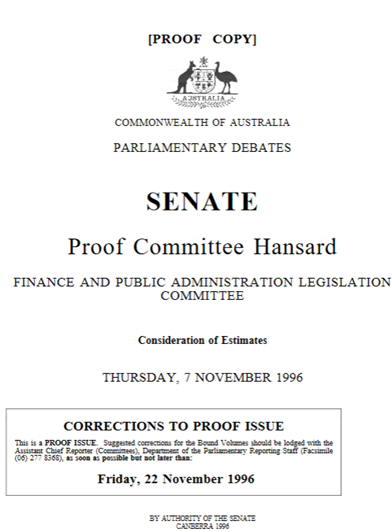
For more information about Capital Monitor download our lookbook or contact us here.

Coming soon in 2022
LexisNexis® is currently developing Clause Intelligence, a new AI-powered tool for lawyers who draft or review contracts. The tool will be available both as a standalone browser-based application and integrated into Lexis® Create in Microsoft Word.
Clause Intelligence surfaces clauses from within LexisNexis precedent content that are relevant to clauses in the user’s own document. Instead of doing time-consuming research, drafters can simply upload their document to the browser-based app or start working on it in Lexis Create to uncover relevant alternative wording or drafting guidance.
Each relevant clause links back to the whole precedent from which it was taken, allowing users to see the clause in context.
The recommendation algorithm has been trained on real contracts to surface the most relevant clauses. Users benefit from seeing multiple options and alternatives, allowing them to tailor the clauses in their own document to better reflect their clients’ instructions and meet their legal and commercial needs. Alternatively, users can use the tool to review the wording proposed by other parties.
Initially, the product will recommend clauses from a range of commercial topics within the Australian Encyclopaedia of Forms & Precedents, with plans to expand into Practical Guidance modules. Clause Intelligence is due for commercial release in Australia in 2022.
Please contact your Relationship Manager or contact us here for more information.

Updates to our 'Medicine' Title by Kate Waterford SC.
Over the course of 2021-2022, we are substantially updating our 'Medicine' title. This includes legislative and case law developments across a wide range of topics relevant to health and medical law, including regulation of health practitioners, consent, euthanasia, confidentiality, tissue transplantation, human reproductive technology, surrogacy, health insurance, and Medicare. The title offers a comprehensive overview of all areas of health law practice, taking into account changes at Commonwealth and State/Territory level.
Our chapter on 'Euthanasia' has been substantially updated to reflect legislative developments at a State level in various jurisdictions legalising assisted dying.
Our chapters on regulation of health practitioners have all also been substantially updated. Now covering each of the 16 health professions regulated by the Australian Health Practitioner Regulation Agency through 15 National Boards, in addition to a chapter on the unregulated profession of Speech Pathology.
We have published a new chapter on Paramedicine, which became a regulated profession in 2018. Extensive information has been added to all of the other chapters, to offer comprehensive oversight of professions such as Occupational Therapy, Chinese Medicine, Dentistry, Medical Radiation Practice and Aboriginal and Torres Strait Islander Health Practice. Each of these chapters includes legislative and case law updates, as well as detailed information about accreditation, licensing and disciplinary procedures specific to the profession.
Coming soon
The 'Professional Negligence' chapter in our Medicine title is expected to be updated within the next few months, completing the comprehensive update of this title.
For more information, please contact us here.

The High Court handed down two major decisions in February 2022 that would determine how a person is assessed as an independent contractor or employee: Construction, Forestry, Maritime, Mining and Energy Union v Personnel Contracting Pty Ltd [2022] HCA 1 (“Personnel Contracting”) and ZG Operations Australia Pty Ltd v Jamsek [2022] HCA 2 (“Jamsek”). The HC decisions reinforce and clarify the need for certainty in a written contract and displaces the previous multifactorial test (which included a wide range of considerations, such as the nature of the relationship between the parties and their actions outside of the written contract) that had been previously considered when determining whether a person was a contractor or an employee.
FEDERAL
The decisions of the two High Court cases in Personnel Contracting and Jamsek are important, because it emphasised that where the parties have written contracts that are unchallenged (as in, not a sham or ineffective in law), it is not necessary or appropriate to look at the parties’ dealings and conduct outside of that contract to determine whether a person is a contractor or employee. Instead, it was enough to focus on their rights and obligations of the written contract to determine the nature of the relationship between the parties. We have updated and enhanced Occupational Health and Safety Law NSW by including new annotations from specialist employment lawyers McCullough Robertson Lawyers.
The recent decision of ACCC v Australasian Food Group Pty Ltd (Peters) found that icecream giant Peters engaged in the practice of exclusive dealing as defined in s 47(4)(a) and 47(4)(b) of the Competition and Consumer Act 2010 in contravention of s 47(1). Peters had entered into a contract with its distributors that included an exclusivity clause preventing other single serve ice cream products being sold in many areas around Australia. This was found to be anti-competitive behaviour.
FEDERAL
The decision in ACCC v Australasian Food Group Ltd Pty, in particular the high penalty that was imposed ($12 million), served as an important reminder to large corporations that there are severe consequences for engaging in anti-competitive conduct. It is also a demonstration of one of ACCC’s compliance and enforcement priorities for 2022/23 which is to target exclusive arrangements by corporations with market power that impact adversely on competition. The upcoming Competition and Consumer Law Newsletter (Volume 37 No 8) will feature an article on this decision written by our general editor and lawyer for the ACCC, Adrian Coorey. Ray Steinwall principal author for Competition and Consumer Act Annotated has incorporated updates to the relevant sections of the Act (s 47(4)(a) 47(4)(b) and 47(1)) that will appear online this month.
In Cassa Bedding Pty Ltd v Insurance Australia Ltd [2022] QSC 1, the Supreme Court of Queensland clarified the standard of proof to be applied in a case involving an insurer denying the claim of an insured where the insurer alleged the fire (the basis of the claim) was deliberately started by the sole director of the plaintiff company. Justice Burns held that while the criminal standard of proof is not engaged in a civil case alleging criminal conduct, the court must be satisfied to a high degree of persuasion and ought to be slow to make a finding that, on the balance of probabilities, the plaintiff is guilty of the alleged conduct.
FEDERAL
Iain Freeman's analysis of the judgment in Cassa Bedding Pty Ltd v Insurannce Australia Ltd [2022] QSC 1 will appear in Issue 37.7 of the Australian Insurance Law Bulletin and clarifies the position of the courts in matters involving arson and insurance. While the application of the civil standard is no surprise, claims involving fire and business are common enough, which makes Iain's analysis of the expanded test in Burn J's judgment useful to practitioners involved in insurance matters. The case also gives some guidance on the interpetation of s 56(1) of the Insurance Contracts Act 1984 (Cth) and what it means for an insured to make a claim for indemnity fraudulently.
Parliament has passed the Corporate Collective Investment Vehicle Framework and Other Measures Act 2022 (Cth) to come into effect on 1 July 2022. This Act established the Corporate Collective Investment Vehicle (CCIV) as a new type of company. The Act will make numerous amendments to the Corporations Act, the most significant being the addition of Chapter 8B- Corporate collective investment vehicles. This chapter sets up the foundational framework for CCIVs including how they will be registered and regulated.
FEDERAL
Australian Corporation Practice (ACP) is currently being updated in advance of these changes, expanding to cover CCIVs, what they are and how they would operate in practice. Customers will have the opportunity to familarise themselves with how these new CCIVs are expected to function and operate in practice before they are offically introduced into corporations law.
A new Chapter 7 Part 1 has been added to the Uniform Civil Procedure Rules in Queensland to provide for a procedure for Preliminary Disclosure. It gives the Supreme Court the power to require a person to give evidence or produce a document or thing that would assist an applicant to make a decision to commence a proceeding or to identify or locate a prospective defendant. These rules are similar, but not identical to rules that are currently in force in most other Australian jurisdictions.
QUEENSLAND
The Civil Procedure Queensland author team has written extensive annotations to these new rules addressing where they are similar and where they differ from the rules operating in other jurisdictions. This will be very useful for Queensland subscribers who are looking to use these new rules to the advantage of their clients.
Significant commercial issues that practitioners in the field should understand were covered in Legalwise's 'Financial Services in 2022' series that occurred over the Tuesdays in March. Leading industry experts discussed issues and key industry updates that are forming the framework for financial services in 2022 and beyond. Expert insights were exchanged and mention of two significant updates emphasised. Firstly, changes to unfair contract terms before parliament were flagged as being influential to the industry and secondly, the discussion of implications of the Banking Code of Practice Review were also highlighted; where practitioners discussed overlap in regulation and wider trends.
FEDERAL
The Financial Services Newsletter, Volume 21 No 4, features an article penned by conference chair and editorial board member, Andrea Beatty and Lucy McCoy (Piper Alderman). The piece details each of the five sessions in the series, briefly summarising the expert insights that were provided. Among the critical legal and commercial issues discussed, breach reporting, dispute resolution, the Treasury's Review of the Australian Payments System and financial hardship practices are explored for readers.
Public health concerns, travel restrictions and everchanging legislatve framework governing execution and witnessing of documents have made it more challenging for commercial parties and their legal advisors to ensure that an intended agreement is binding and enforceable. On 23 February 2022, the Federal Parliament enacted The Corporations Amendment (Meetings and Documents) Act 2022 in an attempt to modernise the execution of documents in a post-Covid world.
FEDERAL
The Construction Law Bulletin Volume 32 No 7 will include an article authored by Alex Ottaway and Rachel Cheung of HWL Ebsworths Lawyers discussing the legisative reforms and outlining how parties can ensure that agreeements, and particularly deeds, are legally enforceable.
A federal election is a key juncture for reviewing the pressing issues in environmental law, and the election approaching on 21 May is dominated by climate change as a key issue.
FEDERAL & STATE
The Australian Environment Review has, for the past three federal elections curated an environmental law and policy special issue. We have planned for, and have again published this special issue ahead of the election on 21 May. Our commissioning editors were able to secure contributions from the Federal Minister for the Environment (Hon Sussan Ley), her Opposition counterpart (Terri Butler), the Greens spokesperson (Sarah Hanson-Young) and two key Independents (Andrew Wilkie and Rex Patrick) to canvass the five most important changes to environmental law and policy for the upcoming election. These articles discuss key trends and flag upcoming developments. The AER is proud to publish this industry-leading issue in time for the election on May 21.
Legislation has now been introduced to permit assisted dying in WA, VIC, TAS, SA, most recently in Tasmania, via the End-of-Life Choices (Voluntary Assisted Dying) Act 2021 (commencement scheduled on 23 October 2022), and in South Australia, via the Voluntary Assisted Dying Act 2021 (expected to commence in 2022).
VARIOUS AUSTRALIAN JURISDICTIONS
Kate Waterford SC has completely updated most of the Medicine title in Halsbury's® Laws of Australia to take into account new legislation and case law, including new legislation expected to commence in 2022 to permit assisted dying in Tasmania and South Australia.
Stefanski v Western Australia [2022] WASCA 5 is a case where the appellant was convicted on his pleas of guilty to two counts of murder but, years later, sought to appeal on the basis that at the time of pleading guilty the appellant did not properly understand that he had an arguable defence (ie, insanity, as he had subsequently been diagnosed with schizophrenia).
WESTERN AUSTRALIA
Criminal Law Western Australia was updated in April by Justice Hall to include his discussion of Stefanski v Western Australia re the annotations to ss 27 and 28 of the Criminal Code (WA), which deal with the defence of insanity and the role of intoxication in negativing the defence of insanity.

The practice of law has changed significantly over the last few years.
New tools like Lexis Create provide instant access to vast amounts of information and analysis and the ability to turn that into actionable insights.
Lexis Create is the one hub you need to create, share and review legal documents. It is designed to sit within Microsoft Word and integrate seamlessly with other LexisNexis products, creating a complete document workflow solution.
The three-stage process: Build, Check, Complete supports you at every step of your drafting process:
- Build provides access to a content database where you can save your own content and search across content that has been created by your colleagues and saved in the firm’s database. Content is saved in the cloud enabling you to collaborate with your team wherever you are.
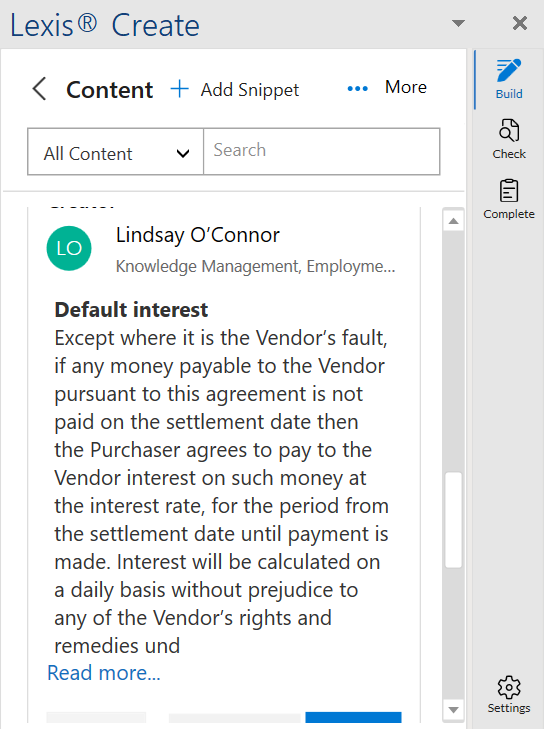
- Check quickly reviews your document and identifies any incomplete, inconsistent or inaccurate information, ensuring you can be confident that your document is error free.
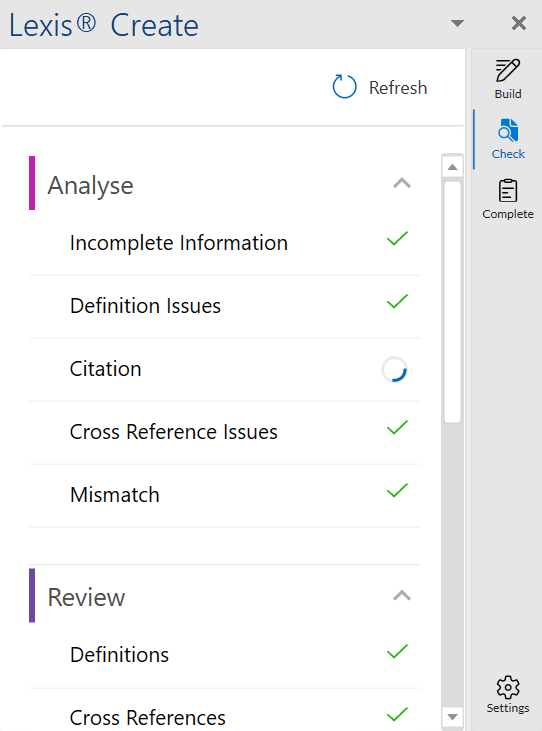
- Complete contains all the tools you need to finalise your drafting, including a redaction tool to safely redact any sensitive or personal information and an integration with Docusign to streamline the execution process.
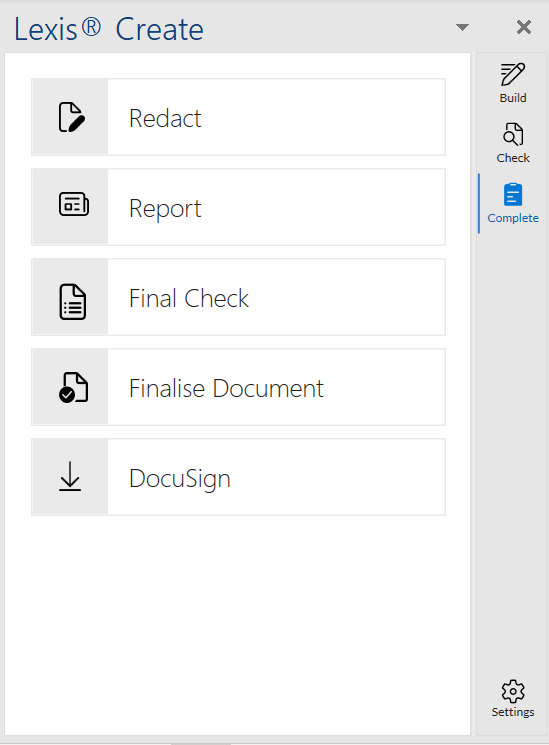
For more information on Lexis Create, download our lookbook or contact us here.

MLex Making News
Our team in Australia continues to build on its record of gripping court coverage by Laurel Henning and James Panichi of antitrust cases, this time highlighting the latest, stunning developments in a bid-rigging case involving Delta Building Association and the National Gallery of Australia.
Online platforms are spending more and more on legal matters related to data protection, privacy and antitrust, and Mike Swift and Khushita Vasant pored over earnings reports to explain that concern is costing Google and Meta Platforms .
New features and improvements
In the last 2 months, we’ve delivered four new features and made improvements to the User Admin Tool:
- Receive alerts for Topics (existing users) - ‘Topic’ filter added to a customized content set.
- Receive alerts for Topics (brand new user) - Create credentials for a brand new user and configure their day-one alert settings to only send an Instant and/or Daily Wrap-up alert when content is published that is tagged with the selected Topic(s).
- Find 'copyright' content more easily - New Topic tag added for 'Copyright' and historical copyright content re-tagged with this topic. This provides a solution for users to easily find copyright content on MLex.
- Conference Listings were released into the product on 19 April, readers can browse regulatory risk conference listing run by third party organizations on MLex platform.
- User Admin Tool improvements - Changes to make the tool more intuitive to use and eradicate two common support problems reported by Admin Users around: (1) The new user has not received their activation email and (2) The Admin User cannot find the name of a user they previously marked as no longer at the company.
For more information download our MLex lookbook or contact us here.

A media intelligence solution, Nexis® Newsdesk allows the search, analysis and sharing of critical information necessary to make data-driven decisions. Helping organisations stay on top of industry trends, inform, and maximize brand awareness conversations, and monitor their online reputation, Newsdesk is powered by 40,000+ data sources aggregating and filtering international and local news, web articles, social media data and more.
In Australia, Newsdesk is used to search an unmatched, global content collection from a single dashboard, helping entities improve their ability to monitor the buzz around companies and brands, and give them the tools to conduct advanced competitor analysis. Recent updates, too many to list here, include the following enhancements:
May 2022
View When Articles Are Clipped
Newsdesk now indicates when yourself or someone else in your organization has clipped a particular article for a search. This icon appears next to the article title.
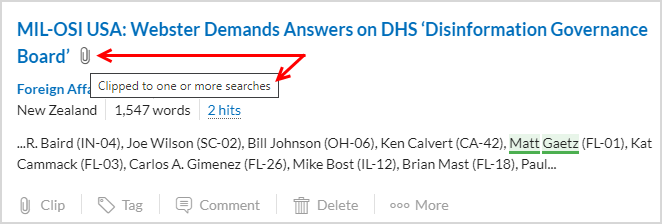
Rearrange Articles in a Newsletter (Modern Theme Only)
New Move Up, Move Down, and Delete buttons directly to each article heading to give you greater control for the order of articles in your newsletter. Newsdesk has added Move to Top/Move to Bottom options to the Newsletter editor. You can find them in the Actions menu (three dots). They allow you to quickly move articles to the top or bottom of the list, rather than moving the article row by row.
Language and Location Filters Moved
The Language and Location filters have been removed from the main search box and added to the More filters drop-down list. This change allows us to simplify the search box, but still give you access to all the great pre-search filters you may need to use.
April 2022
RSS Feed URL Now Available in Saved Search Report
When downloading a saved search report, any RSS exports associated with the search will be included in the report. You will find the URL in the Export RSS Link column.
National Source Lists Added
You can now access the following source lists from Newsdesk: US Major Newspapers, UK National Newspapers, Netherlands National Newspapers
March 2022
Improvements to Saved Content Panel
The Saved Content panel now includes descriptive text for each content type when no content has been added. For example, if you do not have any Shared Content, that section of the panel now indicates that feeds and folders shared with everyone will appear there. This can help you better understand how content is added to this panel. Newsdesk has also added a Favorites option to the Saved Content panel, which allows you to save your most frequently used feeds for quick access.
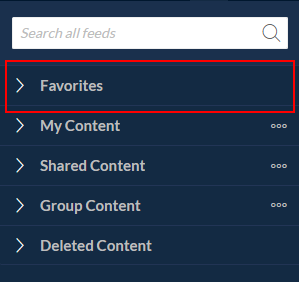
Apply a Global Date Filter
Now, when viewing an analysis, you can apply a date range filter that applies to all charts in the analysis. This option is available from the Actions menu, located above the charts in the analysis.
Improvements to Editing Newsletters
Now, when previewing a newsletter (on the Edit & Send Now page), you can use Up or Down arrows to change where an article appears in the newsletter. This option is available for newsletters with the Modern theme applied. Additionally, when selecting content to include in a newsletter, you can now select a folder from the Saved Content panel and all the content from that folder will be added to the newsletter. When sending an email, the Reply To field on the Edit & Send Now page has been changed to a toggle and added to the To field. If you want to edit this field, click the toggle to show it.
Download Newsletter Usage Data in Usage Stats
Now, when downloading a Newsletter Report, the report will include a new tab which documents the newsletter name, owner, publish status, recipients, content count, and content (i.e., feed or folder names and charts).
For more information on Nexis Newsdesk contact us here.

What's New
Significant overhaul for Practical Guidance Family
A substantial range of new material has been published to reflect the changes to the Federal Circuit and Family Court of Australia (FCFCOA) and associated legislation and court rules that commenced in September 2021, including:
- New topic: Introduction to the Family Law system containing two new subtopics:
- Family Law Courts: which outlines the practices of the different family law courts
- Family law legislation: providing an introduction to the family law legislation
- New precedents:
- Allocation of parental responsibility orders
- Precedent- schooling and education orders
- Precedent orders allocating parental responsibility
- Schooling and education orders
- Application- parent seeking to relocate with school aged child
- Orders restraining parents removing the child from Australia
- Travel and Passport orders
- New checklists, designed to sit in the front of each file for financial and/ or parenting proceedings and will: (a) Inform the practitioner which documents are required to be filed; and (b) allow the practitioner to tick and date the checklist each time they file a document, assisting with compliance (noting the possible penalties for failure to comply with Practice Directions and the Rules) and also provide a quick reference when preparing a brief to counsel or when questioned by the court:
- Checklist: documents to be filed- parenting matter
- Checklist: documents to be filed- property matter
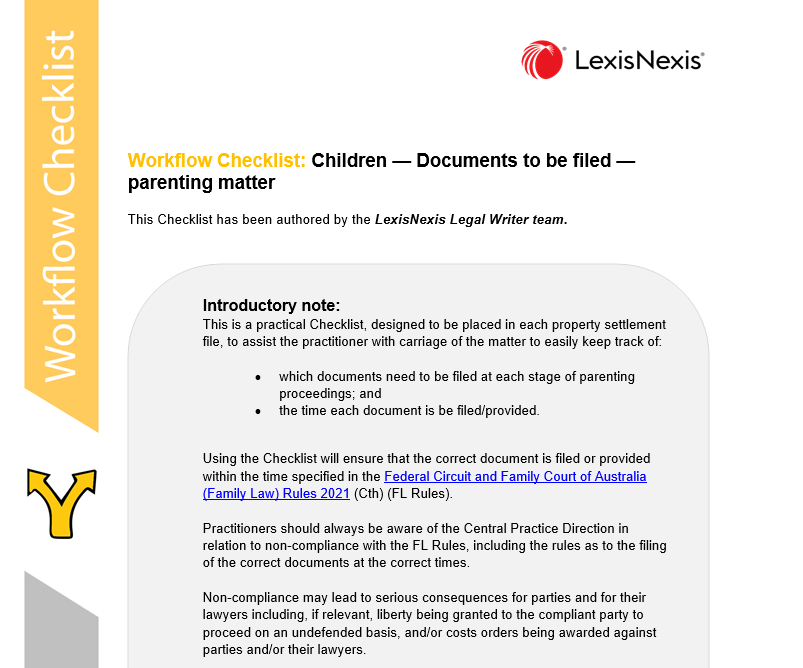
- New Toolkit item: Starting a case: documents to be filed (Federal Circuit and Family Court of Australia).This toolkit item provides quick and accurate reference to the documents required to commence each type of matter in the FCFCOA. Designed to save practitioners the time and frustration that arises when documents are prepared incorrectly, and to streamline the preparation and filing of all the correct documents for each type of matter in the FCFCOA.
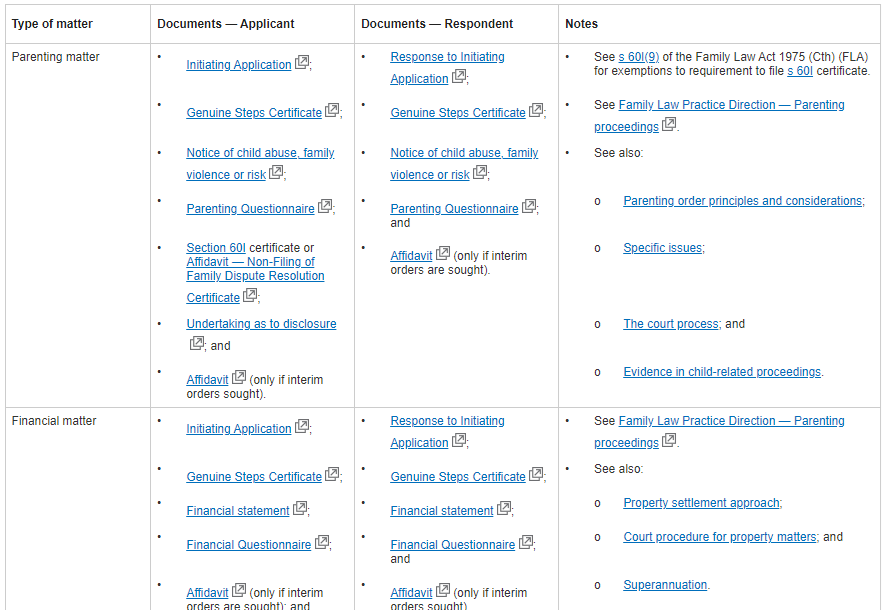
New topics in PG Cybersecurity, Data Protection & Privacy: China’s Personal Information Protection Law (PIPL); and Freedom of Information (GIPA)
New PIPL applicability questionnaire and detailed guidance notes to assist practitioners to understand China’s new Personal Information Protection Laws and what their impact is on Australian business’. English translations of all relevant Chinese legislation included.
Our brand-new topic on the Government Information (Public Access) Act 2009 (GIPA Act) covers the field with respect to this legislation, and includes guidance on key concepts, the procedure for making and responding to a GIPA application, detailed practical guidance on the considerations for and against the disclosure of information, as well as review mechanisms. Our decision checklists will aid practitioners and their clients to follow the correct procedures and in making decisions about disclosure.
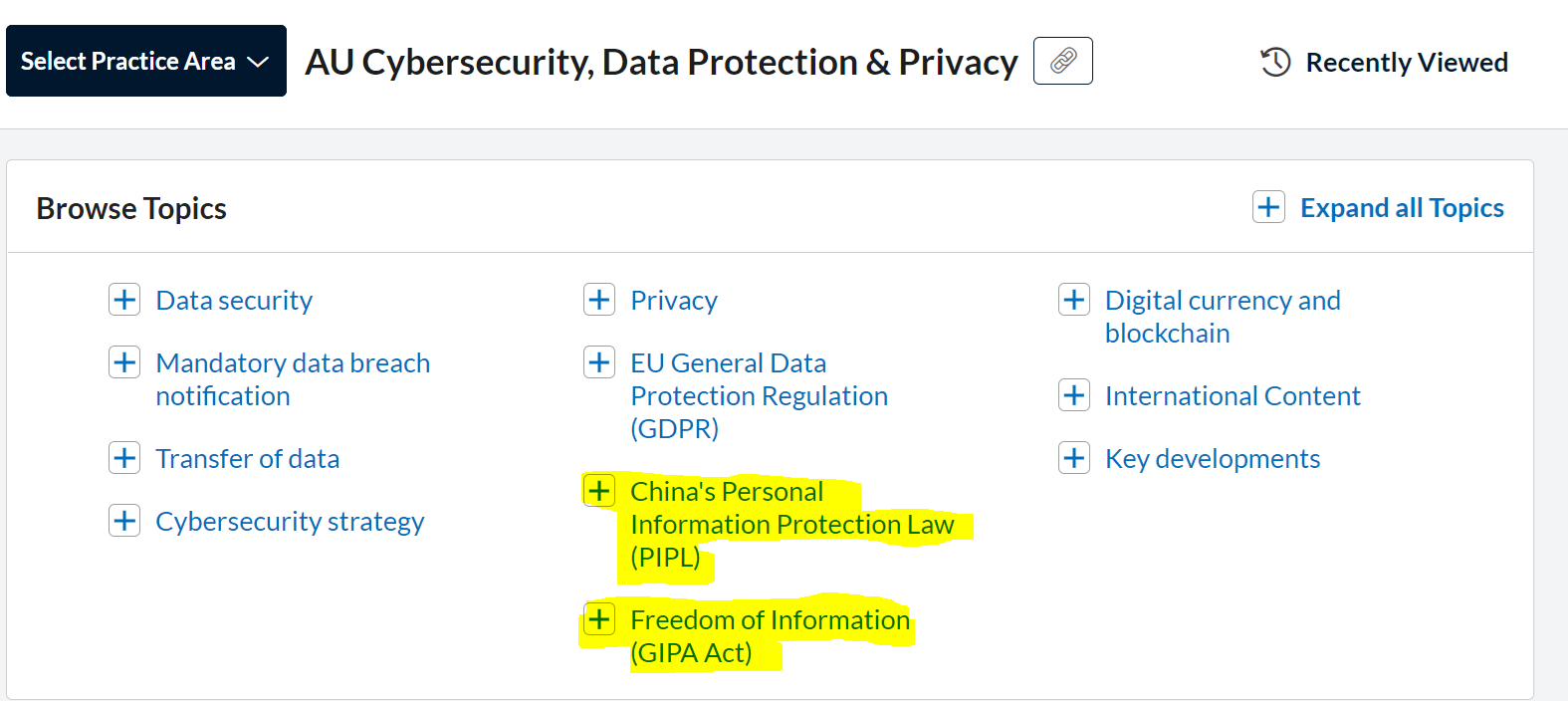
New Latest Legal Updates in PG Business: Ukraine war and sanctions
New detailed two-part Latest Legal Update series to assist practitioners and their clients understand the impact of the Russia and Ukraine conflict on Australian businesses, including an overview of Australia’s autonomous sanctions regime, guidance on what businesses affected by sanctions can do to ensure business continuity, and guidance on what to look for when reviewing commercial contracts in light of the Ukraine war and sanctions.
New subtopic in PG Dispute Resolution: Costs - Disclosure, protections and funding
Ten new guidance notes to assist practitioners in understanding and complying with their statutory costs obligations towards clients when taking instructions in a litigious matter, including preparing costs agreements, estimating costs and making proper costs disclosure. New precedents include a table for estimating costs in litigious matters and precedent letters to clients to provide updated disclosure.
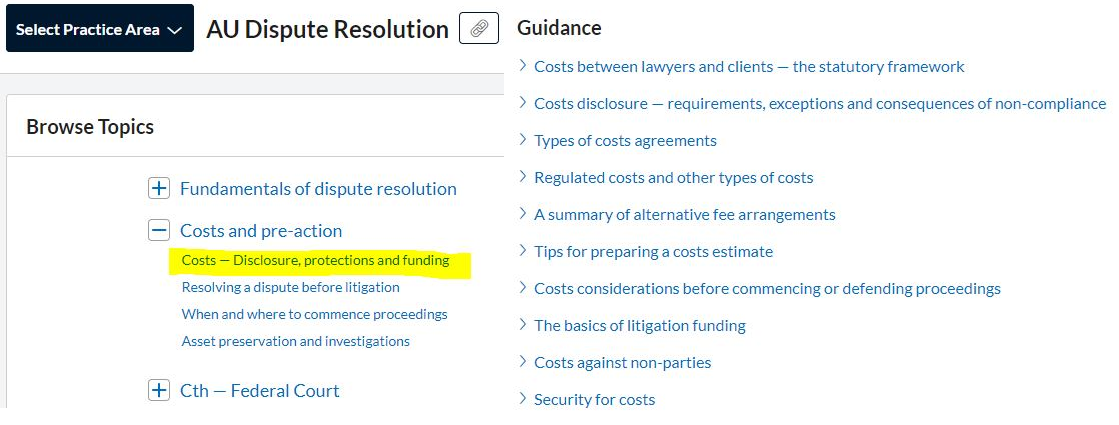
Signing Tool
Significant updates have been made to the Signing Tool, including detailed user tips, to reflect the recent e-signing reforms. The updated Signing Tool includes over 165 additional execution blocks. The accompanying guidance, Tips for signing documents, has also been enhanced to reflect the reforms and cover power of attorney registration requirements. The Signing Tool and guidance is found in the following PG modules: Corporations, Mergers & Acquisitions, Banking & Finance, Business, Property and Insolvency.
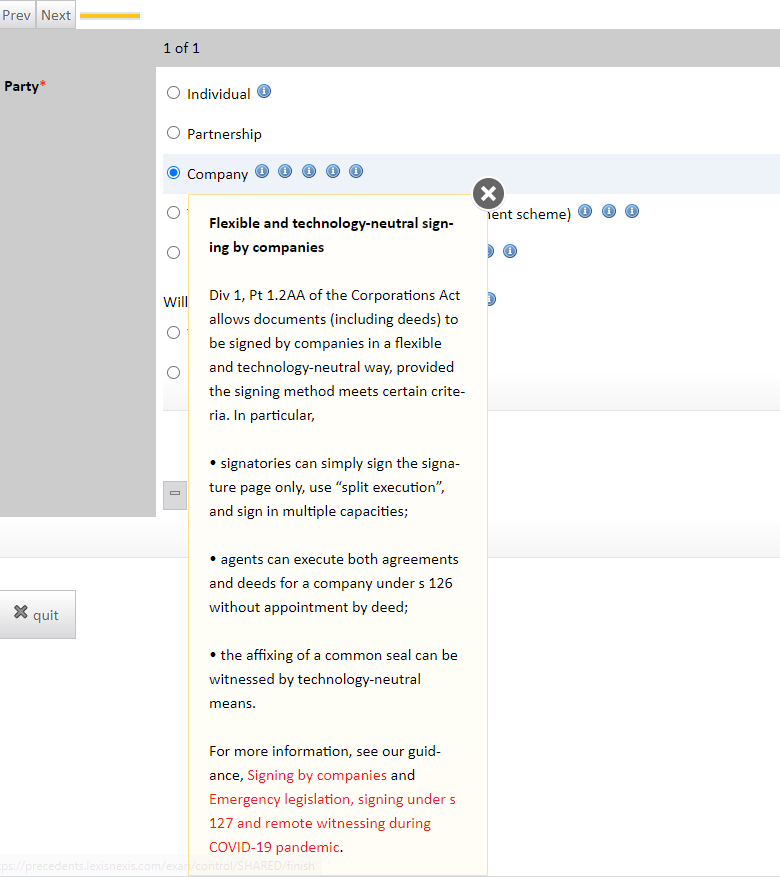
New Infographic on ACCC compliance and enforcement priorities available in PG Competition and PG Consumer
New Infographic summarising, in concise a one page visual, the ACCC’s 2022/2023 compliance and enforcement priorities, as well as their enduring priorities. The infographic also contains 5 key takeaways and a practice tip on the essentials for businesses and the ACCC’s areas of focus for the forthcoming year.
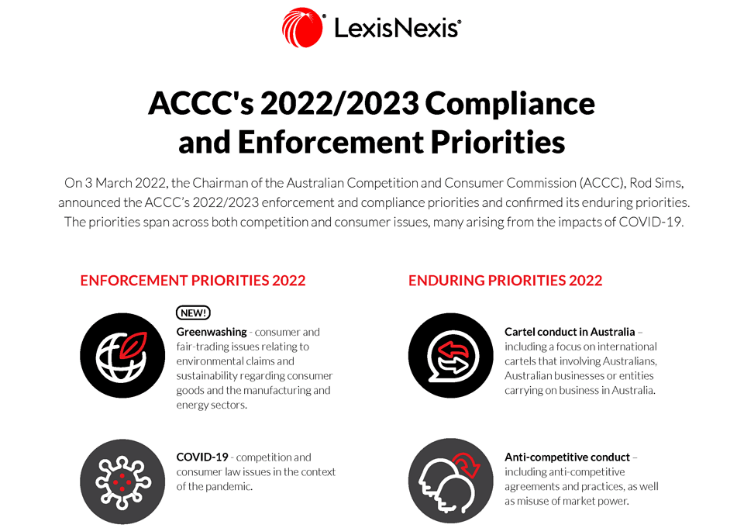
New guidance and workflow checklist in PG Employment
New detailed guidance notes on effective management of misconduct in the workplace, including about the tips and traps when conducting investigations. New checklist for advising clients on liability for penalties under the Fair Work Act 2009 (Cth), including for underpayment contraventions.
What’s coming up?
Coming soon in Practical Guidance Competition
New topic on dealings with others including the competition law issues that may arise when dealing with competitors (eg information sharing, merger transactions and trade associations), dealing with suppliers, distributors and consumers. New toolkit on penalties in exclusive dealing cases including the pecuniary penalty awarded and whether other penalties and remedies (such as compliance programs and payment of ACCC costs) were ordered.
Coming soon in Practical Guidance Cybersecurity, Data Protection and Privacy - Enhanced guidance on Blockchain and digital currency, and Consumer Data Rights
Substantially enhanced guidance on blockchain and digital currency including new guidance on Smart contracts, Blockchain, NFTs, Seed, Tokens and more. Brand new topic covering the Consumer Data Rights regime and its economy wide roll-out.
Coming soon in Practical Guidance Banking & Finance - Restructured electronic signing guidance
Restructured and enhanced guidance on electronic signing, including:
- Jurisdictional summary table (featuring quick snapshot of applicable measures in each jurisdiction and links to more detailed guidance)
- New guidance note on e-signing under the Corporations Act
- New guidance notes on e-signing/remote witnessing in states that have implemented permanent reforms including in relation to deeds, ie NSW, Queensland and Victoria.
Coming soon in Practical Guidance Business - Enhanced guidance on Contract creation fundamentals
Substantially enhanced guidance about fundamental contract law principles of contract creation to assist practitioners drafting and reviewing commercial contracts, including enhanced guidance on consideration, certainty, capacity and common “battle of the forms” issues in commercial contract negotiation.
Coming soon in Practical Guidance Dispute Resolution - New Supreme Court coverage for WA, SA and the ACT
Conduct litigation with confidence in the Supreme Court of Western Australia, the Supreme Court of South Australia and the Supreme Court of the Australian Capital Territory with new comprehensive topics containing detailed guidance notes, checklists and precedents that provide step-by-step practical guides to court procedures in those jurisdictions and pull together the relevant legislation, court rules, practice directions, cases and curated links to analytical commentary.
Coming soon in Practical Guidance Intellectual Property - new Checklists for trade mark registration, trade mark oppositions and timeline for infringement matters
New checklists will be published for use when dealing with an adverse examination report issued in respect of a trade mark application, and separate checklists for applicants of and opponents to a trade mark application. Each checklist sets out the key issues and deadlines to consider when responding to an examination report. A new workflow checklist setting out the estimated timeline for a trade mark infringement claim in the Federal Court will also soon be published.
Coming soon in Practice Guidance Mergers & Acquisitions - New topic on internal reorganisations
Whole new topic on planning and running an intra-group solvent reorganisation, with guidance on key issues, transaction structures, advisors and workstreams, and essential documentation. Supported by a suite of tailored precedents including short-form share purchase agreement, template steps list, and adaptable ancillary documents.
Coming soon in Practical Guidance Personal Injury (Victoria) - New table covering Damages Awards in Victoria
We will be making our table of “Damages Awards Victoria — Significant Cases” more comprehensive, covering both economic loss and general damages along with any other heads of damages awarded. This will form part of a broader enhancement with the Personal Injury modules for New South Wales and Queensland.
Coming soon in Practical Guidance Property - Enhanced guidance on dealing with water entitlements and goods in Victorian transactions and updated guidance and precedents in retail leasing
New and updated guidance around water entitlements within Victoria will assist those dealing in land where the property has water entitlements or where the property is in a rural area. Updated guidance and precedents for retail leasing across all jurisdictions.
Coming soon in Practical Guidance Employment - enhanced module workflow task tool
Revamping of Employment Frequent Tasks Tool to step practitioners through key steps for common employment and industrial workflow tasks.
Practice area highlights
- PG Banking & Finance - Updated signing tool to reflect permanent reforms on electronic signing provisions under the Corporations Act.
- PG Business - New detailed two-part Latest Legal Update series to assist practitioners and their clients understand the impact of the Russia and Ukraine conflict on Australian businesses. Enhanced business sale and purchase (asset sale) workflow tools to assist practitioners when acting for either buyers or sellers. Enhanced guidance on Fundamentals of corporate group structures, including basic principles of corporate structuring. Enhanced Contract law guidance on breach and repudiation of contract. Updated guidance on contracts and COVID-19. Updated subtopic on consumer credit.
- PG Competition - New infographic on the ACCC’s 2022-2023 compliance and enforcement priorities, as well as new guidance note covering its priorities in detail. New sub-topic with guidance on the competition law issues that may arise in intellectual property matters.
- PG Consumer - New infographic on the ACCC’s 2022-2023 compliance and enforcement priorities, comprehensive new checklists on mandatory product safety reporting obligations and unconscionable conduct. Enhanced guidance on statutory unconscionable conduct and unconscionable conduct under the unwritten law.
- PG Corporations - New tool on ASIC 2022 regulatory and corporate governance priorities, including 5 tips for what companies and businesses can do. Meeting and signing reforms captured in a new subtopic entitled “Technology neutral communication”, and updated subtopics covering members’ meetings and resolutions, directors’ meetings and resolutions, and virtual meetings. New precedent board minutes and resolutions for approving or revoking powers of attorney, accompanied by deed of revocation of power of attorney.
- PG Cybersecurity, Data Protection & Privacy - new topic on China’s Personal Information Protection Law (PIPL) including an applicability questionnaire to assist with determining whether this data security regime has to be considered, and English translations of key Chinese legislation; new topic on the Government Information (Public Access) Act 2009 (NSW) (GIPA Act) detailing the concepts and procedures under this freedom of information regime; two sets of new white label training materials on data breaches which customers can tailor to fast track their presentations on notifiable data breaches to both lawyers and non-legal staff.
- PG Dispute Resolution - New subtopic entitled “Costs - Disclosure, protections and funding” with ten new guidance notes and precedents to assist practitioners in understanding and complying with their statutory costs obligations towards clients in litigious matters. Enhanced and updated guidance notes and precedents in the Queensland court topics to reflect the overhauled regime for expert evidence under the amended Uniform Civil Procedure Rules 1999 (Qld).
- PG Employment - New guidance on managing and investigating misconduct. New checklist to support liability advice for Fair Work Act 2009 (Cth) contraventions.
- PG General Counsel - Updated documents to reflect recent changes to ASIC Integrity Market Rules, proposed changes to consumer data right and the continued increase of penalties imposed by the courts for breach of unconscionable conduct provisions under the ACL.
- PG Governance - Revamped Governance Frequent Tasks Tool that provides a more comprehensive list of key governance documents. Updated materials to reflect the amendments to the Corporations Act 2001 (Cth) introduced by the Corporations Amendments (Meetings and Documents) Act 2022 (Cth) permanently allowing companies and registered schemes to execute documents electronically and use technology to convene and hold meetings and distribute meeting-related materials.
- PG Insolvency & Restructuring - PG Insolvency & Restructuring - New subtopic covering winding up a registered managed investment scheme including some the key issues that commonly arise. New guidance on insolvent responsible entities. New subtopic covering deregistering and reinstating a company. Updates to guidance on unfair preferences to cover the latest case developments. Updates to tax issues affecting company liquidations. Updates to insolvent trading claims guidance. Updates to our guidance for directors facing financial distress including a comparison of the features and downsides of the various insolvency options.
- PG Intellectual Property - new subtopic covering other protection under the Copyright Act, being moral rights and protecting performers.
- PG Mergers & Acquisitions - Overhauled M&A Frequent Tasks Tool providing roadmap and essential resources for key private M&A transactions and related issues. New checklist and enhanced guidance on post-completion restraints of trade in private M&A transactions. New and updated guidance on Foreign Investment Review Board (FIRB) issues and exemptions and new checklist guiding practitioners through lodging an application with FIRB.
- PG Personal Injury (NSW, Qld and Vic modules) - new Case Summary Tables of Damage Awards, planned for publication in Q3.
- PG Property - Updated guidance on remote signing and witnessing of documents in all jurisdictions, including updated signing tool.
For more information, download our latest PG lookbook or contact us here.

De-mystifying Practitioner Books Online – also known as ‘PBOs’
LexisNexis Practitioner Books Online take the comprehensive and expert commentary contained within a hard copy text designed for practitioner use and integrate it with Lexis® Advance. Practitioner Books Online enable readers to start research via expert explanation and then click through to legislation, caselaw and secondary materials referenced in the text.
For both novice researchers and those more experienced in a subject matter, Practitioner Books Online offers a highly effective launching point for comprehensive research of a matter or issue.
Accessing Practitioner Books Online on Lexis Advance
Practitioner Books Online can be accessed on Lexis Advance via the ‘browse’ feature or the search bar.
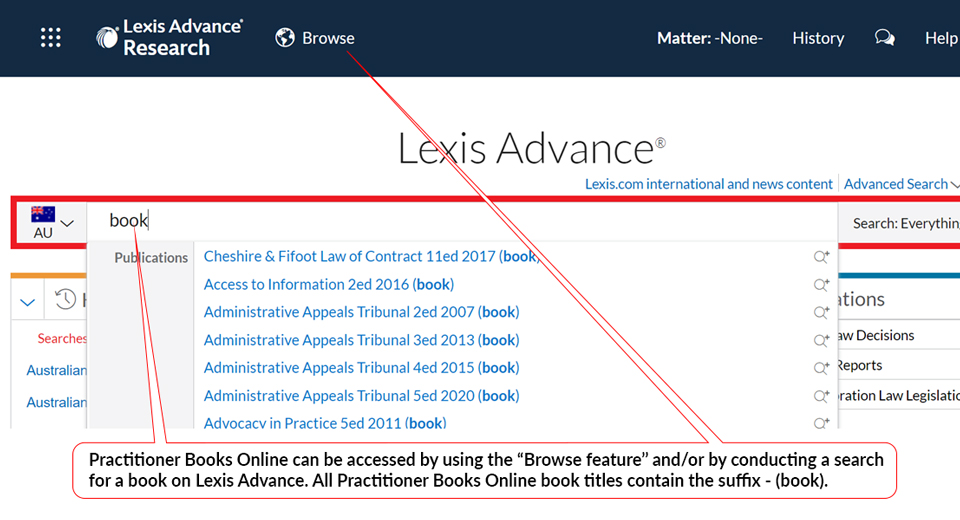
Users could also access Practitioner Books Online by navigating to the “View Publications” pod and selecting the appropriate filters i.e., secondary materials → Textbooks
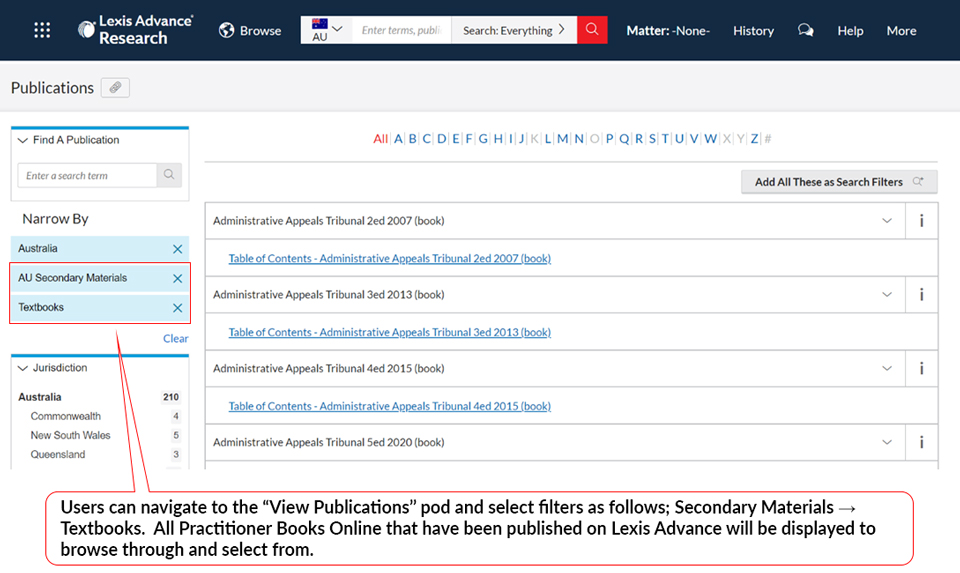
How can Practitioner Books Online help legal professionals?
Like all other formats (hard copy, eBooks and Red books), Practitioner Books Online provide low-cost access to authoritative content and complement the broader content sets on Lexis Advance.
- Can be accessed through a central point of access on Lexis Advance
- Can be accessed via other LexisNexis products such as LawNow Plus™ Legislation Citator
- Concurrent access for as many Lexis Advance users as set up
- Complements research by being available alongside other LexisNexis material on the platform
- Contain links to relevant legal content such as Cases and Legislation
- Having Practitioner Book Online on Lexis Advance means you can use the sophisticated AI-driven search provided by Lexis Advance including intuitive features like the search term map
- The front cover and prelim pages are available so users can download those along with relevant passages to hand up in court (or to stakeholders) to establish the edition, author, and currency
- Page breaks are captured so users can compare with the print version if they need to.
For more details regarding the Practitioner Books Online publishing schedule and subscriptions please contact your Relationship Manager or contact us here.

LexisNexis launches Web Services APIs.
The LexisNexis Web Services APIs were launched in May 2022. An API (or Application Programming Interface) is a method by which two disparate systems or software’s could talk to each other. They are a toolkit that your IT teams could use to pull data from LexisNexis into your workflows in the way you want it to be surfaced - without logging into the products, from behind the firewalls directly into your environment.
Some practical examples of how APIs can be used in practice include:
Create a customised workflow ─ Add a simple search box to your Intranet Portal or Practice area pages to surface search results directly from us
Integrate with your data ─ Add information from your Firm’s document management systems to the custom-built workflow to get more cohesive results.
Be aware of changes ─ Use the APIs alerting capabilities to stay informed of changes and the impact of regulations or key aspects of the Law most relevant to your matter on a real time basis.
Enrich your data experience ─ Ensure you have the most recent and marked up search results from your content provider along with the firm data you are using in your task.
… all from within your own workflow, intranet, DMS (Document Management System), or library management systems.
The API returns resources (results lists, documents, tables of contents, etc) in JSON and XML formats. All the required structural and semantic information is present, unburdened of any verbose and representation-specific markup. This means smaller files for faster performance, and the freedom to style, present, transform, and integrate the content into your internal workflow and DMS to suit your lawyers’ specific needs. The API uses widely accepted technical standards* to maximise interoperability with a wide range of internal systems used by our customers.
If you would like to know more or explore how we can integrate content from Lexis Advance into your organisation’s working environment, please contact your Relationship Manager.
* The API uses the OAuth 2.0 framework for authentication and exposes resources using REST-based data services based on the OData 4.0 protocol.
** Some LexisNexis content may not be available via Lexis Web Service APIs. Contact your Relationship Manager for more details.
Poll
If you would like to discuss how the Web Services API can facilitate the above features or explore different ways to integrate content from Lexis Advance into your working environment, please contact your Relationship Manager.
Contact Us Form
 LexisNexis
LexisNexis





